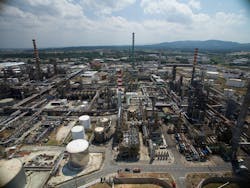Eni awaits final regulatory approvals for Livorno biorefinery project
Eni SPA is ready to begin construction pending remaining government approvals on the operator’s previously proposed project to convert its idled 84,000-b/d conventional crude oil refinery in Livorno, Tuscany, on Italy’s northwestern coast, into what will become the country’s third biorefinery (OGJ Online, Oct. 18, 2022).
Following start of on-site preparatory works that began earlier this year, formal construction activities for the Livorno industrial-site conversion and biorefining project will begin as soon as Italy’s Ministry of the Environment and Energy Security (MOEES)—in consultation with local authorities—issues the final single-authorization and related building permit, Eni said on Sept. 10.
Without specifying a timeframe for when it expects to receive the permit, the operator said this last regulatory hurdle follows previous project approvals granted by the MOEES, Italy’s Ministry of Culture, the Italian National Institute of Health, and Tuscany’s regional government based on an environmental impact assessment for the development Eni submitted in November 2022.
Approved for final investment decision (FID) by Eni in January 2024, the proposed transformation project will involve construction of three new biorefining plants designed to process various biogenic feedstocks—mainly vegetable waste and residue—to produce hydrotreated vegetable oil (HVO) diesel, HVO naphtha, and bio-LPG (OGJ Online, Jan. 29, 2024).
Forming part of Eni's broader decarbonization strategy to achieve carbon neutrality by 2050 in line with the global energy transition and increase subsidiary Enilive SPA’s current 1.65-million tonne/year (tpy) systemwide biorefining capacity to more than 5 million tpy by 2030, the new plants will include:
- A biogenic feedstock pretreatment unit to transform waste raw materials, residues, and waste resulting from the processing of vegetable products and oils from crops that do not compete with the food chain into renewable feedstock.
- A 500,000-tpy plant for production of sustainable aviation fuel (SAF) based on the Eni-Honeywell UOP LLC codeveloped proprietary Ecofining technology for flexible processing of 100% biofeedstocks.
- A plant for producing hydrogen from methane gas.
Most recently scheduled to begin formal construction in fourth-quarter 2024 for completion by 2026, the Livorno transformation and biorefining project joins a series of other proposed biorefining projects Eni is developing, including Enlive’s:
- Recently approved joint venture (JV) with partners Petroliam Nasional Berhad’s (Petronas) Petronas Mobility Lestari Sdn. Bhd. and Euglena Co. Ltd. of Japan for construction of a grassroots biorefinery in the Pengerang Integrated Complex (PIC) at Johor in southern Peninsular Malaysia that—slated for startup in second-half 2028—will use Ecofining technology to flexibly process about 650,000 tpy of biofeedstocks into SAF, HVO, and bionaphtha (OGJ Online, July 26, 2024).
- Eni-approved JV with LG Chem Ltd. to jointly develop a grassroots biorefinery at LG Chem’s integrated petrochemical complex in Daesan, Chungcheong Province, South Korea, that—also to be equipped with Econfining technology—would flexibly process about 400,000 tpy of biofeedstocks into SAF, HVO, and bionaphtha in 2026, pending final project approval by LG Chem (OGJ Online, Jan. 19, 2024).
- Second-phase expansion to enhance processing flexibility of its existing Venice biorefinery at Porto Marghera, Italy that—pending positive FID on the project due in first-quarter 2025—could add up to 600,000 tpy of fresh capacity at the site, Eni told investors in its first-half 2024 results presentation.
Eni—the first global operator to convert two of its conventional refineries into biorefineries—first began producing biofuels in 2014 by processing vegetable oils and biomass waste into renewable diesel following conversion of its former 80,000-b/d Venice refinery, followed by transformation of the 105,000-b/d Gela refinery on the southern coast of Sicily in 2019.
About the Author
Robert Brelsford
Downstream Editor
Robert Brelsford joined Oil & Gas Journal in October 2013 as downstream technology editor after 8 years as a crude oil price and news reporter on spot crude transactions at the US Gulf Coast, West Coast, Canadian, and Latin American markets. He holds a BA (2000) in English from Rice University and an MS (2003) in education and social policy from Northwestern University.

